I was approached by whanau in the UK about the Whakatu beer logo (see below). I was asked if I could/would do anything as I have has some success in the past with such cultural appropriation. After looking at Exmoor marketing document, I agreed. The following images are from the web, not the marketing document.
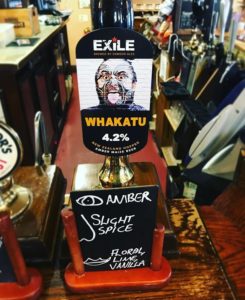
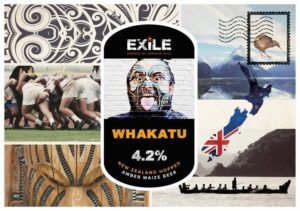
I took the most public method possible and tweeted the company offering them a chance to explain or to make them aware (tweet below).
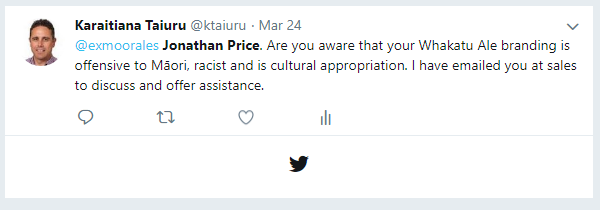
I also found their contact email on their web site and emailed them (see blow).

On March 28, I had noticed that ExmoorAles had ignored my tweet and I believe they also deleted it. My email was also ignored.
So I took to Twitter as the first step to get their attention. Other plans were to utilise social media and the UK media. I do not believe that anyone should send a nasty tweet first off. But I felt that because I was actively being ignored (similar to Huggies who then stated the verified Twitter account was in fact a fraud) that I would use the word UK and the hastag #UK to get peoples attention from the UK.
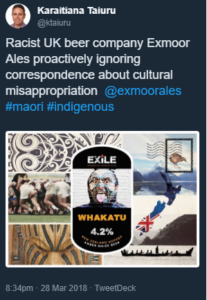
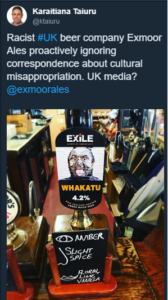
The benefit of having dealt with another UK craft brewer only a few weeks ago gave me some great Twitter networks in the UK with craft beer tweeps.
Thanks to @amscraig for raising the initial company and her networks which included @craftbeercoll who then tweeted @MelissaCole whose Twitter profile describes the her as “Award-winning beer hack; sommALEier; International beer judge of mystery; Certified Cicerone; Author; Bad cricketer; Occasionally successful fisherwoman”.
@MelissaCole then contacted me and asked me to email her details as to why the image is offensive, noting that she had an idea but didn’t want to get it wrong.
In a rush I sent through a rough email that outlined as much as I could think of in the short period of time before travelling out of town. I was conscious of the fact that I had made some serious allegations of a company, that did not deserve to wait a few days for me.
Here is the text of the email that I sent to @MelissaCole. It is too big to screen shot as I did with the other messages.
Here is a quick brain dump with a copy of a Tweet I sent them. I did also email the sales address last week. The tweet looks like it was deleted and I have had no response.
Cultural appropriation and inappropriate usage of Indigenous culture was once common in an uneducated world. Since then, there has been more consideration and the practices have largely stopped. There is an abundance of media related articles and literature written by indigenous people demonstrating that these kinds of images are offensive and unacceptable.
Just a few weeks ago, National Geographic have apologized to the world for their racist profiling of Indigenous and minority cultures that spanned decades https://www.washingtonpost.com/news/morning-mix/wp/2018/03/13/national-geographic-confronts-its-past-for-decades-our-coverage-was-racist/?utm_term=.e4a1e2530a5b.
A commercial conglomerate Kimberly-Clark Corporation who own the brand Huggies, a trusted New Zealand name for baby nappies removed a number of pages from their web site that contained inappropriate and offensive Māori baby names and advice. https://www.radionz.co.nz/news/te-manu-korihi/352585/huggies-removes-offensive-list-of-maori-baby-names
Another small craft beer brewery in Bath UK apologized and removed from their sites and their affiliates an offensive Māori label. https://www.taiuru.co.nz/removal-of-offensive-to-maori-material/
In the New Zealand the Hokitika food festival removed a photo of a lady culturally appropriating Naïve American and First Nations headgear.https://www.radionz.co.nz/national/programmes/checkpoint/audio/2018637521/public-outrage-at-wildfoods-festival-s-advertising
The Whakatu image being complained about is likely to be offensive to a large population of Māori and is at the very least cultural appropriation by using the Māori culture in a manner that is offensive for commercial gains. Personally, I deem it racist as do many others I know.
How do you justify using someone’s else’s culture without any knowledge of what it is or with no regard or benefit to that culture?
It is offensive in the Maori culture for food and beverages to be associated with the head. By doing so, the person is demeaned and cursed and the food or beverage is no longer able to be consumed.
It is not clear if the picture of the male Maori has been stolen form the Internet? The tattoos on the face are called Tā Moko. Tā Moko is a graphical story of an individuals genealogy and their personal achievements. It is offensive using another person tā moko as it appears is the case with the image in question. It is also offensive to have tā moko and alcohol associated with each other.
The man in the image is doing a pukana – eyes wide open and tongue protruding. This is typically done to scare opposition or an enemy away. It has nothing to do with food or beverages.
It is common to see foreigners mock Māori culture and imitate the pukana that they have seen in a haka (war dance) usually at Rugby. Therefore, it can only be assumed that the creator has seen Māori do a pukana and think that it looks funny, therefore looks good to mock Māori and add to the product.
If you were in New Zealand and produced the label, it would likely be against the Bill of Rights Act, Human Rights Act and be the cause for a number of complaints to the Human Rights Commission.
Likewise, if you avoided the racism complaints and applied for a TradeMark it would be deemed offensive to Maori under the TradeMarks Act by the Māori advisory council of which I am a member, for several reasons including Tapu/Noa principle as the head is on a beverage and mocking of the Māori culture and the geographic indicator as Whakatu is the original name of the city not called Nelson.
Possible TradeMark breach. In the advertising, it is stated that the beer is named after the little known NZ hop of the same name. I assume the beer is a variant spelling of the New Zealand Hop Wakatu™ Brand 77-05 in 2011. In which case you this may be a breach of TradeMark https://en.wikipedia.org/wiki/Wakatu_HopsOr at least the name is the correct spelling of what the hop.
I am more than happy to discuss this more with the individual brewer, or to assist to write some guidelines so that Māori culture can be used in a respectful manner with beer products.
Only hours after sending the email above, I received a reply. The email is below.
The following Tweet was also made by Exmoor Ales
My email response was to thank Jonathan and to seek co operation as to where the image came from. If the image is for sale online, there are new issues that need to be considered and addressed. I also offered some advice for he was going to use another Māori design int he future.
Observations from this case.
- As with the Huggies cultural case ignorance was claimed of their online brand and monitoring. It is of interest that an email and a tweet were not noticed by the company, nor was any activity on Twitter. A basic brand reputation exercise is to have alerts on the web and social media when your brand is being mentioned. The fact that the company looked for the email and couldn’t find it is suspicious considering my Tweet was also removed.
- It took a local person in the same industry, who based on looking at their profile is an influential figure in the UK Craft beer industry, to intervene.
- Despite the copious media articles, research and online material, there is still ignorance of cultural appropriation, despite the creators not intending any offence or harm.
- Copyright and Intellectual Property laws need to be updated and consider Traditional Knowledge of Indigenous Peoples. Here in New Zealand, Māori need to be recognised with such consultations and to be recognised with digital considerations. The Pale Stale Male scenario is coming to mind at the moment.

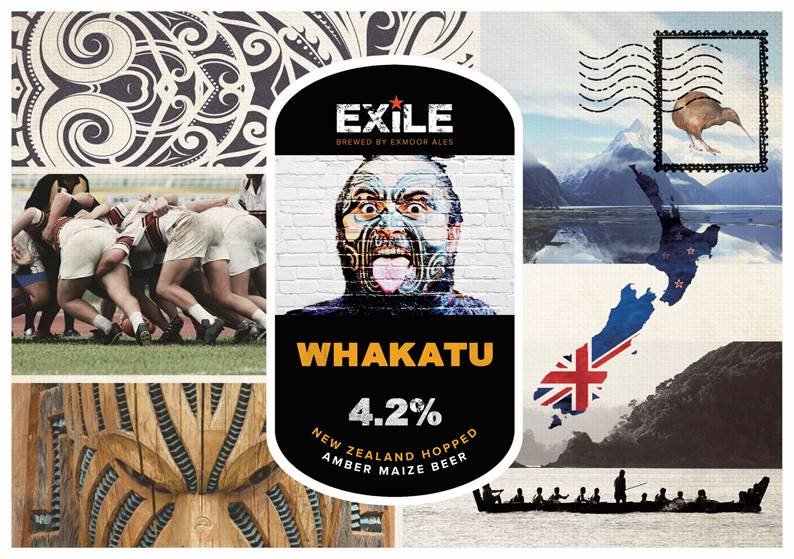

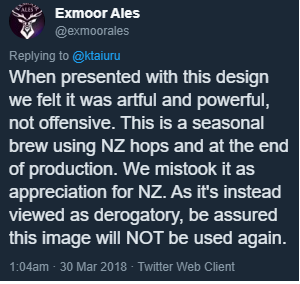
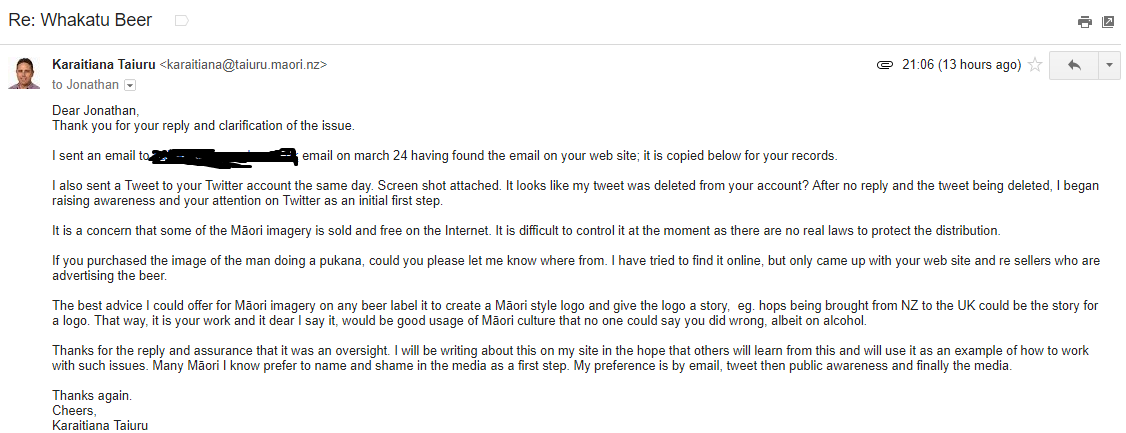
Leave a Reply
You must be logged in to post a comment.